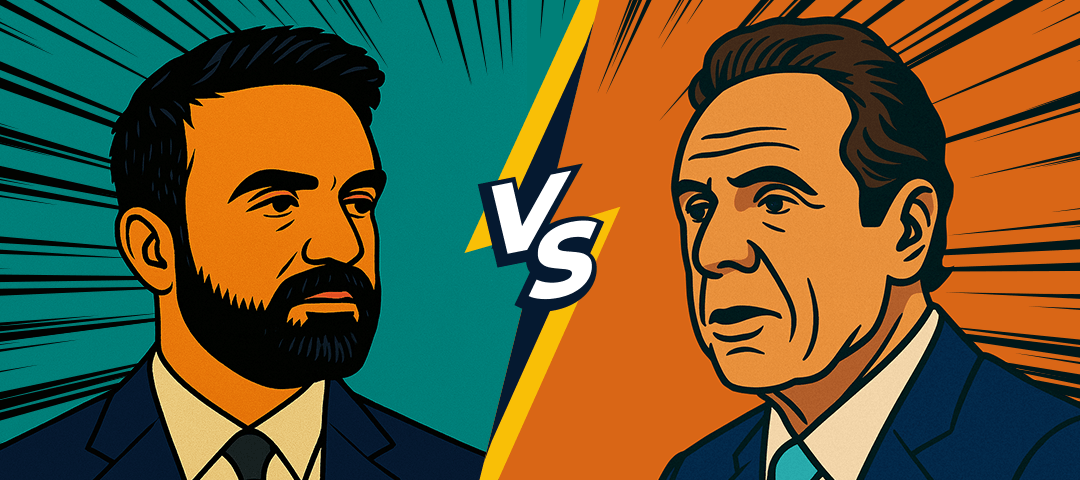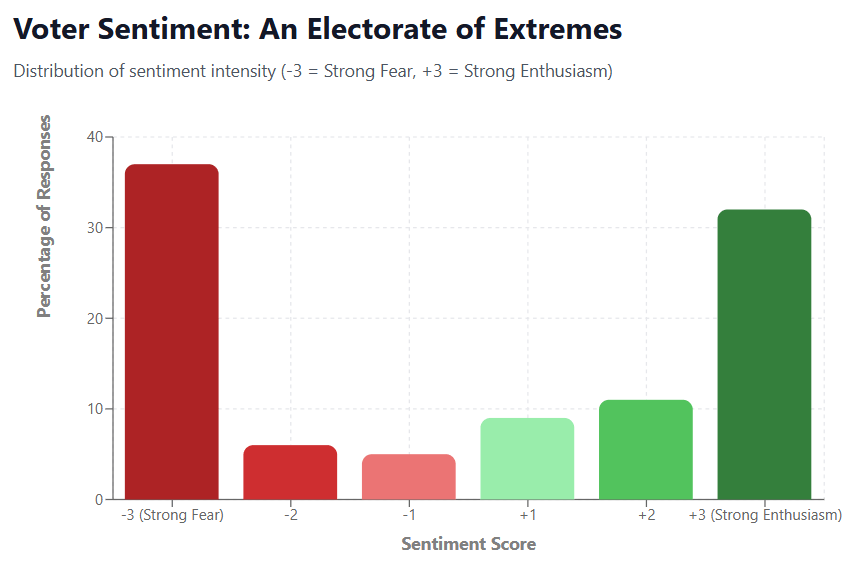
Beacon Research partnered with CloudResearch to uncover what’s truly motivating voters in New York City’s 2025 mayoral race. Using CloudResearch’s AI-powered conversational survey platform, Engage, the team interviewed over 600 representative New York City voters. New York City is heading toward a high-turnout election, but the electorate is driven by radically different motivations. On the one side, a hopeful, aspirational vision for the future. On the other side, a fearful and desperate desire to prevent a perceived existential threat. By engaging in in-depth conversations, this report aims to provide a deeper look at the electorate by including the voice of the voter – something that is often missing from public discourse.

Figure 1: Voter Sentiment Reveals a Deep Emotional Divide
The Politics of Hope: Mamdani’s Supporters
Zohran Mamdani’s supporters express a strong sense of hope and excitement for his candidacy, seeing it as a significant departure from the status quo. Over two-thirds of his supporters report feeling more enthusiastic about voting this year than in past elections. They view Mamdani as a fresh voice for the working class and praise his economic vision—policies like corporate tax hikes, rent freezes, and public grocery stores aimed at making life in New York more affordable.
As one enthusiastic supporter explained:
Zohran Mamdani is the only candidate, apart from maybe Obama, I have ever felt excited to vote for and who actually represents my values. If he wins, it feels like it could change everything for the better in NYC.
A common theme is the belief in Mamdani’s commitment to progressive change, particularly focusing on affordability and equity in New York City. Many supporters are enthused by his emphasis on policies that are seen as crucial measures for the working class. One voter articulated this sentiment:
Finally a candidate that seems sincere and authentic in their desire to improve material conditions for ALL new yorkers, not just the wealthy elites.
His proposals for new transit improvements and universal childcare also resonate strongly, portraying him as a candidate who cares deeply about reducing financial burdens on ordinary citizens.
Another key aspiration among supporters is Mamdani’s move away from corporate influence, which reinforces his image as a politician focused on public good rather than private interests. As one supporter noted:
He’s not controlled by special interest groups or far right groups.
This stance on economic issues, alongside his dedication to fostering inclusivity, bolsters the view of Mamdani as a genuine advocate for change.
His candidacy is often compared to that of other progressive leaders like Alexandria Ocasio-Cortez and Bernie Sanders, with supporters highlighting his authenticity and ability to inspire hope similar to their influence in politics. His recognition and address of systemic issues, such as income inequality and discrimination, foster an image of Mamdani as a brave, honest leader willing to challenge established norms. This authenticity is evidenced by supporters who say:
He is direct and honest, he doesn’t answer questions with evasive propaganda, he speaks with facts.
Supporters are particularly encouraged by his transparent communication style and his candid policies that resonate with everyday people. One voter expressed:
There’s a candidate that I truly believe in that gives me hope during a politically turbulent time in our country. A true love for the city and all the people who live here. I feel like this candidate cares about many different ways of making people’s lives better.
Many express that his grassroots approach is not just refreshing but necessary for the political climate, launching hope that city leadership can realign with the needs of the populace rather than entrenched interests.
His youthful energy and vision for a more equitable New York inspires many voters to believe in the possibility of real change. As one supporter passionately stated:
We desperately need a new mayor and I’m excited about the opportunity to vote for someone from my generation who represents my progressive values.
Another added:
Zohran Mamdani and the prospect of voting for someone who truly wants to make life better for all New Yorkers. He brings hope that goodness, empathy, fairness can actually be the bedrock of our democracy – that doing the right thing for the many IS a winning strategy.
Through his transparent advocacy for the underrepresented and his rejection of conventional political rhetoric, Mamdani embodies the hopes of a constituency eager for transformation. One voter summarized this sentiment:
I feel like I can finally vote for a candidate that has more than half of my support and is actually concerned with making the city better. I think their socialistic and progressive values are exactly what we need to drive this city forward.
By emphasizing both practical and visionary policy goals, he captures the optimism of voters who are ready to support a leader they see as capable of turning aspirations into reality.
The Politics of Fear: Cuomo’s Supporters
On the other side, Andrew Cuomo’s supporters express deep anxiety about the city’s future. Fear—not enthusiasm—defines their motivation. A pervasive theme throughout the interviews is the fear of Mamdani’s policies, which many perceive as socialist, and the negative impact they believe such policies could have on New York City. The anxiety is palpable in comments like:
I am Petrified that a child socialist communist anti semite might become mayor of New York City” and “Existential dread. I feel if the wrong candidate gets elected then we as a city are very much doomed.
Numerous participants expressed concerns that Mamdani’s proposed policies would be financially detrimental and impractical, potentially leading to increased taxes and the introduction of untested social programs. One voter warned:
He will bankrupt our city. The plans he has for our city are not practical, not sustainable, and we will be bankrupt. He does not know what he’s talking about. Socialism will not work. It never has worked.
For instance, participants argued that Mamdani’s plans, such as free bus and grocery services, are unsustainable, with one stating:
I see challenges because New Yorkers want change and that’s understandable but why a person with zero experience in holding any type of official office like governor or mayor? Why someone who’s so disconnected with reality that a couple of years ago talked about defunding the police but all of a sudden changed his mind?
Another major concern is the perceived risk to public safety should Mamdani’s policies be enacted. Participants frequently mentioned the fear of increased crime rates due to policies they believe would undermine law enforcement efforts, such as defunding the police. One voter bluntly stated:
He is a monster that needs to be stopped. He will destroy NYC.
More robust police presence is a priority for many Cuomo supporters, as one descriptive voice noted:
NYC does not need empty promises.
This comes amid wider sentiments that Mamdani’s stance is anti-police, a point that some see as turning New York into a less secure city.
The personal impact of a Mamdani victory weighs heavily on many voters. One supporter of Cuomo confessed:
I am very concerned about the effects of a Mamdani victory on my family’s future and quality of life. If he wins we will probably end up leaving NYC.
Another echoed this sense of desperation:
I’m feeling depressed that Mamdani may win and ruin our city.
Social issues are also at the forefront of concerns for Cuomo supporters. Mamdani faces criticisms regarding alleged anti-Semitic views, which he denies but continue to cause unrest among Jewish communities in the city. There’s a prevalent worry that expressions of support for Palestinian causes by Mamdani could harm the city’s Jewish residents and exacerbate social tensions. One participant reflected on this, expressing their apprehensions:
As a Jewish woman, I’m scared anti semitism will rise even more than it already has.
Another stated more bluntly:
A terror coddling socialist antisemite should not lead this City. I dislike them all, but Mamdani is dangerous. He refuses to condemn terrorism, he is antisemitic and his lunatic socialist policies will do a lot of damage if he is elected and able to implement his agenda.
Additionally, there is widespread sentiment among Cuomo supporters that voting for him is more of a tactical decision than an expression of enthusiasm for his policies. Many see their support for Cuomo as a means to prevent Mamdani from implementing what they view as harmful ideas, leading to economic and social instability. One voter candidly admitted:
I can’t stand Cuomo, but at least he isn’t a democratic socialist!
Another summarized:
Cuomo is garbage but Zohran is radioactive garbage.
An underpinning fear is that Mamdani’s lack of experience could lead to a deterioration of governance standards in a city already grappling with significant challenges. A particularly illustrative comment from a participant summarizes these fears:
I feel that a lot is on the line in this election. Not like the end of the world but definitely something close to it.
Another added:
Absolutely need for myself, my people and family to come out and vote and STOP another potential disastrous Diblasio 2.0 mayorship (Mamdani) that my once beautiful city absolutely cannot afford again and are still reeling from.
One voter put it more succinctly:
If voters are sensible, they should choose Sliwa or the city goes down the drain.
These narratives frame a strongly reactive support base for Cuomo, marked more by opposition to Mamdani’s perceived risks than by a proactive endorsement of Cuomo’s proposals or past leadership. Supporters are motivated by a desire to protect the city’s current trajectory and to prevent a shift towards policies they fear could destabilize New York’s social and economic fabric. As one voter summarized:
Mostly the fear of Zohran Mamdani becoming mayor, which could be tragic for the city.
As Beacon Research’s findings suggest, fear and hope are equally potent forces, and together they are shaping not only this election but likely future contests across the city and beyond.









